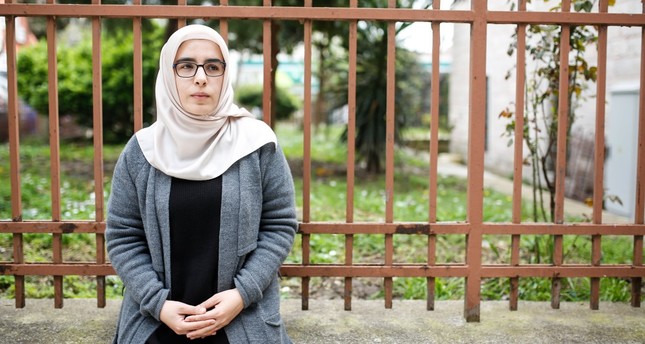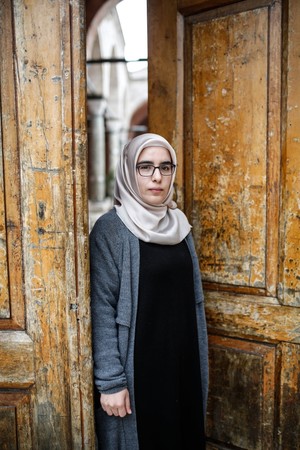
'Nur Alhuda Hijazi:
"We were collecting aid for war victims in Syria. We were communicating through social media. Assad's soldiers hacked our friend's account and wrote us on his behalf, saying there are reliable people that will help us, they are expecting us in that place. We thought it was our friend and went with another man and woman to that address. We thought maybe they are from the intelligence, and laughed. Then, we dropped the guy from the car so that he would tell our families where we were in case we got caught. We saw the red car they mentioned and moved forward. Fifteen soldiers came and began to beat us, swearing. Ten minutes later, we saw our other friend caught as well.
They took us to an intelligence building. They blindfolded us with our headscarves so that we would not see anything. They kept insulting and beating us. They started to touch our bodies, harassing us. They took three of us to separate rooms. They asked me for Facebook, Skype addresses and passwords we used for aid. Their purpose was to reach out to other humanitarian helpers, to block aid and to learn the location of drug stores and other supplies.
They kept beating me for not talking. Then I gave them a Skype account that I had opened two days ago. I did not give them my personal account, but they asked me the address for my username. They talked to my friends through my account. A friend of mine wrote that he wanted to know where the drug stores in Damascus were. I made him understand that I did not write under normal circumstances when I wrote to him. The officer was angry that he could not get anything.
They started hitting me. Meanwhile, my phone started ringing. My friends were worried and kept calling us. They started asking me who they were. They kept torturing me to tell them. Then I realized there was someone next to me. When I spoke quietly, I realized it was the girl I came with. We were blindfolded and handcuffed. We talked quickly about what to say.
We did not know who was there with us. Then they took us to another room separately. In that room, they stripped me from head to toe. I was naked and so ashamed. This was inhuman. They inspected my body by hand. I felt terrible.
They took us to a cell at midnight. We were in a 6-square-meter room. There were seven other women of different ages there and a 13-year-old girl. We realized that they were constantly raping her. Over time her belly began to grow.
They claimed that she helped the soldiers. She was constantly raped. She was in a terrible situation. She was just a little girl.
Our first question I asked was if they were being tortured. We relaxed when they said that they do not do it in this building. Then we noticed that they opened the heater core and talked to the people in the next cell. There were male inmates in there imprisoned for five years. "Will the war end, will the world help us?" they asked us. "Hopefully, you will be all released, the war will end, all Muslims will help us," I told them, not wanting to disappoint.
They were pleased. Some of them were hafizes and imams. They started reciting the Quran. I remember crying my heart out.
There were some blankets on the floor and two little openings where we could breathe. The cell smelled musty. They were constantly giving us hard, cold potatoes. Every day we had indigestion from eating the potatoes. They allowed us to go to the toilet three times in 24 hours. There were only 6 minutes for nine women to use the toilet. The soldiers waited for us, and when we exceeded the time limit, they forced the doors open to take us out. They only allowed us to wash ourselves after our periods. So, we could have a bath once a month.
I was afraid whenever I heard the sound of the iron door because I knew they were taking me to be tortured. One day they called my name and blindfolded and handcuffed me. They took me to the interrogation room. "Give us the names of the opponents, where are they?" they started to ask. They kept hitting me when I said I didn't know. Then they gave me electric shocks. I jumped up from where I sat with each shock. It was very violent. The soldiers laughed as I screamed in pain. They tortured me for seven hours without stopping. But I did not give up a name.
On the third day, they left me in a corridor with my eyes blindfolded and hands tied since I still had not given up a name. Those coming and going started hitting me and swearing. On the seventh day they gave me seven white papers. "You will write what we say," they said. When I refused, they took me to a room. There were four beds and soldiers on it. "If you do not speak, these soldiers will rape you," they said. I could not endure this torture any longer. I wrote what they said on paper. I had no other choice.
They made me write that I helped the soldiers, that I worked for soldiers instead of civilians through social media. They made me read what I wrote in front of a camera. They broadcasted that video on official Syrian television. "We imprison them, but they are traitors, not victims; they are helping the soldiers," they said on the news.
They were bringing young people to the cells every day. They were torturing them with both electric shocks and pressurized water. They were screaming in pain. Our mental health had collapsed from hearing those sounds. We were praying and waiting for the voices to stop.
On the 17th day, the warden called me and my friend and said, "You will not make any noise, you will take your things and come here." We returned to the cell and everyone thought we were going to be released. They wrote the phone numbers of their families on tiny papers and sanitary pads and hid them in the seams of our pants and coats. We hoped to deliver a message to them.
We thought we were going to be released, but they took us and imprisoned us in a 2-square-meter cell, and nobody came for days. We were very scared. There were only cells with male prisoners around us. We waited for five days.
On the 27th day, they blindfolded us and took us downstairs. They first put us in an automobile and an hour later in a bus. We heard other men and women in there with us. We got out of the intelligence building. I was trying to see the roads by looking down. I realized we were in Damascus. Then we entered a tunnel. At that moment I said oh my God. I had heard that Assad had underground dungeons made just for women. I said they were taking us there for sure, and there was no longer a way of salvation, we were going to a horrible place.
I was very scared at the moment. A soldier put me directly in an elevator. I smelled perfume in the elevator. The floor was sparkling clean. Then I realized this was not an underground dungeon. They took us to an elegant office. There were two women and three men in the room. We sat in front of them. A general came and said, "Now two Turks will come and meet with you, and you will say 'all is well' for everything they ask." We agreed.
Those sitting in front of us were İHH Humanitarian Relief Foundation President Bülent Yıldırım and İzzet Şahin. "We came from Turkey. Hopefully we will get you out," they said. They had swapped us. We returned to the cell, and two days later we were released with the help of the İHH. They swapped us for Iranian soldiers. We were the first swap. In the second swap, there were 2,350 people like us, including 180 women.
Bülent Yıldırım said we could call our families and come with them to Turkey immediately if we want. My family told me to go right away. But we wanted to stay and give humanitarian aid to those hurt by Assad's persecution. I worked as a nurse after jail. I opened an orphanage. We started with 250 children who were orphaned in the war. Before coming here in 2015, there were 2,200 orphan children. I got out of jail in October and never saw my family until 2015. I missed them very much. I decided to go and see my father in Belgium. I came to Turkey to go to Europe by sea.
I opened Google Drive on my new phone while I was at Atatürk Airport. I saw İzzet Şahin's number on my screen without knowing how. A total coincidence. I called to thank him. "Nur, wait there, we will come and get you with Bülent Yıldırım," he said. "It is very dangerous to go to Europe by sea, you can die, we do not accept it, and if you work with us, you will prepare documents and go to your father legally." I have been working for the İHH since that day. I applied to do a master's degree on Islamic Economy. I miss my homeland very much. I think about why this happened and why so many people die all the time. But I still have hope. Freedom is a blessing; nobody knows its value. I pray that I am free." '

0 Response to "A survivor from Assad's dark prisons tells it all"
Post a Comment